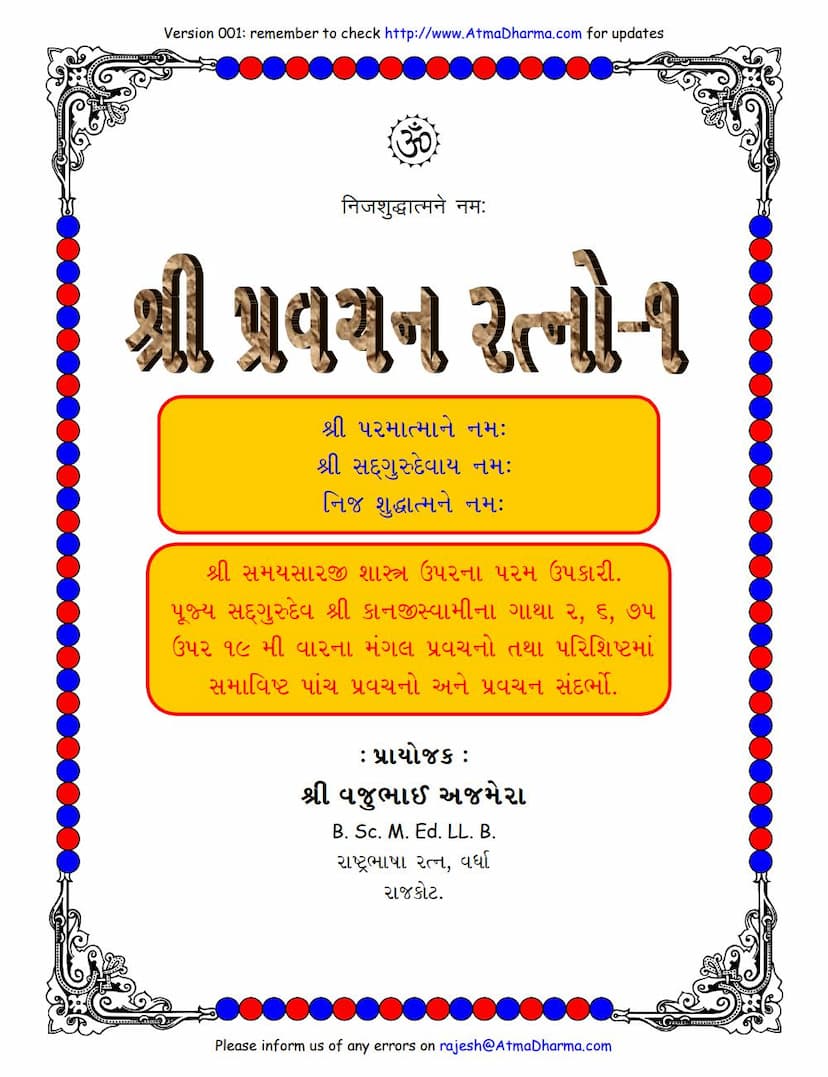Pravachana Ratno 1
Added to library: September 2, 2025

Summary
This comprehensive summary covers the Jain text "Pravachana Ratno 1" by Kanjiswami, focusing on the provided pages. The text is a collection of discourses on the Shri Samaysarji Paramagam, specifically focusing on verses (Gathas) 2, 6, and 75, along with additional appendix discourses.
Core Themes and Teachings:
The central theme revolves around the nature of the Soul (Jiva) and its relationship with external substances (Pudgala) and internal states. Kanjiswami, through his discourses, aims to elucidate the profound spiritual truths of Jainism, particularly emphasizing the concept of the pure Soul (Shuddhātmā) and the path to liberation (Moksha).
Key Concepts Discussed:
-
The Nature of the Soul (Jiva):
- The Soul is described as pure, eternal, and inherently free from any external substances or qualities. It is beyond the concepts of birth, death, and any form of suffering.
- The Soul's inherent nature is characterized by pure knowledge (Jnana), pure perception (Darshan), pure conduct (Charitra), infinite bliss (Ānanda), and infinite strength (Virya).
- The Soul is described as Jñāya-k. This means it is the knower, the seer, and the experiencer of all phenomena, but it does not get tainted or altered by what it knows or perceives.
- The text strongly emphasizes the Soul's self-luminosity and self-awareness (Svaparaprakāshak) – its ability to know itself and, in a relative sense, all other substances without being affected by them.
-
Distinction between Self (Svasamaya) and Non-Self (Parasamaa):
- A significant portion of the text is dedicated to meticulously explaining the distinction between the Soul's true nature (Svasamaya) and the non-soul (Parasamaa).
- Parasamaa is identified with external substances (Pudgala) and their modifications, including karma, body, speech, mind, and internal emotional states like attachment (Raga), aversion (Dvesha), desire, and anger. These are considered impure and external to the Soul.
- The discourses stress that the Soul, by its very nature, does not undergo transformation into these non-soul states, nor does it truly "know" them in the sense of becoming one with them.
-
The Process of Knowing (Jñāna):
- The text delves deeply into the nature of knowledge itself. Kanjiswami clarifies that while the Soul knows all things, this knowledge is not an interaction or a merging.
- Knowledge is described as an inherent attribute of the Soul, like light illuminating objects without becoming the objects themselves. The Soul's knowledge is self-referential; it knows itself and its own states, and through this self-awareness, it apprehends external objects without being affected by them.
- The concept of "self-other illumination" (Svaparaprakāshak) is explored, highlighting that the Soul's innate nature is to know, and this knowing faculty, while apprehending externals, remains eternally pure and unaffected in its essence.
-
The Illusion of Agency and Causality:
- A recurring theme is the refutation of the Soul's agency in the modifications of external substances or even its own perceived impure states (like Raga). The text argues that the Soul, being pure and unchanging in its essence, cannot be the "doer" (Karta) of these impure states.
- While the Soul's knowledge apprehends these states, it is not their cause. The causal relationship is intricate and explained through the lens of dependent origination (Nimitia) and the Soul's own nature. The discourses clarify that while external causes (Nimitia) like karma or the body are involved in the manifestation of impure states, the Soul's pure nature is never corrupted.
-
The Path to Liberation (Moksha):
- The ultimate goal is to realize the Soul's pure, inherent nature and abide in that realization. This is achieved through profound contemplation, right faith (Samyakdarshan), right knowledge (Samyakjñāna), and right conduct (Samyakcharitra).
- The path involves detachment from all non-soul (āparigraha, asati) and a deep internal focus on the Soul's true essence. The discourses encourage the listener to turn inwards, understand the distinction between the Self and the non-self, and ultimately realize the Soul's pure, liberated state.
-
Emphasis on Understanding through Discernment (Viveka):
- Kanjiswami's approach is characterized by its analytical rigor and emphasis on logical discernment. He meticulously breaks down complex philosophical concepts, contrasting different viewpoints (like those of Shankhya or Vedanta) with the pure Jain perspective.
- The discourses encourage listeners to think deeply, reflect, and ultimately realize the truth through their own inner experience and understanding, rather than blindly accepting doctrines.
-
The Role of Compassion and Selfless Action:
- While the ultimate emphasis is on self-realization, the concept of compassion (Daya) and righteous actions (Dharma) are discussed in the context of their spiritual utility. However, the core message remains that these external actions, while potentially meritorious, are not the direct path to liberation. The path lies in the realization of the pure Soul.
Structure and Content:
The text is presented as a series of discourses, likely transcribed from Kanjiswami's oral lectures. The language is Gujarati, rich in philosophical terminology and analogies designed to make complex spiritual concepts accessible. The discourses are structured around specific verses of the Samaysar, offering detailed interpretations and elaborations. The tone is deeply devotional and encouraging, guiding the listener towards self-inquiry and spiritual realization.
Overall Message:
"Pravachana Ratno 1" serves as a guide to understanding the fundamental tenets of Jain philosophy, particularly the nature of the Soul and the path to liberation. Kanjiswami's profound spiritual insight, conveyed through clear and insightful explanations, aims to awaken the listener to their true, eternal, and pure Self, leading them away from the bondage of worldly existence towards spiritual freedom. The repeated emphasis on discerning the Self from the non-self, and understanding the true nature of knowledge, is central to the teachings.
This summary captures the essence of the provided text, highlighting the philosophical depth and practical guidance offered by Kanjiswami.